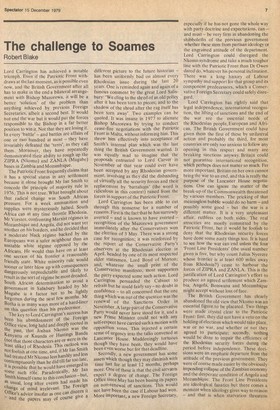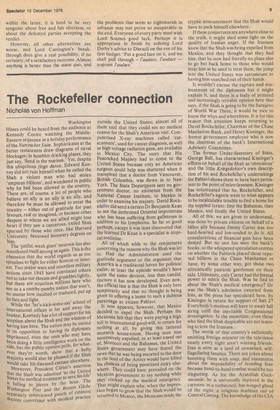The challenge to Soames
Robert Blake
Lord Carrington has achieved a notable triumph. Even if the Patriotic Front withdraws at the last moment, as is possible even now, and the British Government after all has to make in the end a bilateral arrangement with Bishop Muzorewa, it will be a better 'solution' of the problem than anything achieved by previous Foreign Secretaries, albeit a second best. It would not end the war but it would put the forces responsible to the Bishop in a far better position to win it. Not that they are losing it. In every 'battle' — and battles are affairs of one or two hundred at most — they have invariably defeated the 'terrs', as they call them. Moreover, they have repeatedly demonstrated their ability to rough up the ZIPRA (Nkomo) and ZANLA (Mugabe) bases in Zambia and Mozambique.
The Patriotic Front frequently claims that it has a special status in any settlement because it alone brought Mr Ian Smith to concede the principle of majority rule in 1976. This is not true. What brought about that radical change was South African pressure. For a week ammunition and supplies were mysteriously halted. South Africa can at any time throttle Rhodesia. Mr Vorster, confronting Marxist regimes in Mozambique and Angola, did not want yet another on his borders, and he decided that a moderate black regime backed by the Europeans was a safer neighbour than an unstable white regime opposed by the Africans. He would thus have on at least one section of his frontier a reasonably friendly state. White minority rule would sooner or later blew up with consequences dangerously unpredictable and likely to result in the sort of regime he most dreaded. South African determination to avoid a government in Salisbury headed by Mr Mugabe is a factor not to be lightly forgotten during the next few months. Mr Botha is in many ways more of a hard-liner on this question than his predecessor. The key to Lord Carrington's success has been his abandonment of the Foreign Office view, long held and deeply rooted in the past, that Joshua Nkomo was the Kenya or Kaunda or Hastings Banda knot that those characters are or were in the least alike) of Rhodesia. This outlook was not foolish at one time, and, if Mr Ian Smith had treated Mr Nkomo less harshly and less contemptuously than he did till far too late, rsit is Possible that he would have ernerged in le such role. Paradoxically, Mr Ian Smith himself came to this conclusion —but, as usual, long after events had made his change of mind irrelevant. The Foreign r‘ liffice's advice insofar as one can discern it and the papers may of course give a different picture to the future historian — has been uniformly bad on almost every Rhodesian issue during the last 20 years. One is reminded again and again of a famous comment by the great Lord Salisbury: 'We cling to the shred of an old policy after it has been torn to pieces; and to the shadow of the shred after the rag itself has been torn away'. Two eXamples can be quoted, It was insane in 1977 to alienate Bishop Muzorewa by trying to conduct cease-fire negotiations with the Patriotic Front in Malta, without informing him. This threw him effectively into acceptance of Smith's internal plan which was the last thing the British Government wanted. It was equally mad to imagine that the proposals entrusted to Lord Carver in November of that year could ever have been accepted by any Rhodesian government, involving as they did the disbanding of virtually all the security forces and their replacement by 'battalions' (the word is ridiculous in this context) raised from the forces in support of the Patriotic Front. Lord Carrington has been able to cut through this nonsense for a number of reasons, First is the fact that he has narrowly averted — and is known to have averted — recognition of the Muzorewa government immediately after the Conservatives won the election of 3 May. There was a strong case for recognition; it was reinforced by the report of the Conservative Party's observers at the Rhodesian election in April, headed by one of its most respected elder statesmen, Lord Boyd of Merton; and, whatever the small print of the Conservative manifesto, most supporters the party expected some such action. Lord Carrington persuaded the Cabinet to refrain but he could fairly say no doubt in confidence — to all concerned that the one thing which was out of the question was the renewal of the Sanctions Order in November. A large part of the Conservative Party would never have stood for it, and a new Prune Minister could not with any self-respect have carried such a motion with opposition votes. This injected a certain sense of urgency into the talks convened at Lancaster House. Maddeningly tortuous though they have been, they would have been even worse but for that deadline.
Secondly, a new government has some assets which though they may diminish with time last for at least 12 months, perhaps more. One of these is that the civil servants expect !A degree of change. The Foreign Office since May has been basing its papers on non-renewal df sanctions. This would not have been the case if Labour had won. More important, a new Foreign Secretary, especially if he has not gone the whole way with party doctrine and expectations, can — and must — be very firm in abandoning the shibboleths of the previous government whether these stem from partisan ideology or the engrained attitude of the department. Lord Carrington could disregard the Nkomo syndrome and take a much tougher line with the Patriotic Front than Dr Owen dared do, whatever his personal inclination. There was a long history of Labour sympathy and support for that group and its component predecessors, which a Conservative Foreign Secretary could safely disregard.
Lord Carrington has rightly said that legal independence, international recognition, the lifting of sanctions and the end of the war are the essential needs of the Rhodesian people, European and African. The British Government could have given them the first of these by unilateral action and probably the third, for most countries are only too anxious to follow any opening in this respect and many are breaking sanctions anyway. Britain could not guarantee international recognition, which perhaps does not matter so much. Far more important, Britain on her own cannot bring the war to an end, and this is really the purpose of the Lancaster House negotiations. One can ignore the matter of the break-up of the Commonwealth threatened by various members. The pricking of that meaningless bubble would do no harm — and possibly some good — but the war is a different matter. It is a very unpleasant affair, ruthless on both sides. The real atrocities are mostly committed by the Patriotic Front, but it would be foolish to deny that the Rhodesian security forces have done some nasty things too. It is hard to see how the war can end unless the four 'Front Line Presidents' (the usual number given is five, but why count Julius Nyerere whose frontier is at least 600 miles away from Rhodesia?) cease to harbour the forces of ZI PRA and ZANLA. This is the justification of Lord Carrington's effort to produce an agreed settlement which Zambia, Angola, Botswana and Mozambique might accept without loss of face.
The British Government has clearly abandoned the old view that Nkomo was an essential figure to be placated. Two things were made crystal clear to the Patriotic Front: first, they did not have a veto on the holding of elections which would take place, war or no war, and whether or not they agreed to participate; secondly, nothing would be done to impair the efficiency of the Rhodesian security forces during the period before independence. These decisions were an emphatic departure from the attitude of the previous government. They were of course made easier by the obviously impending collapse of the Zambian economy and the desperate condition of Angola and Mozambique. The Front Line Presidents are ideological fanatics but there comes a moment when ideology gives way to reason — and that is when starvation threatens stability. The Rhodesian decision to cut supplies to Zambia was well timed, also their action in blowing up bridges on the Tanzanian railway, which produced predictable left-wing squawks in Britain. There can be no doubt that Mr Kaunda and Dr Machel leant very heavily on the Patriotic Front leaders. It was significant that only two Front Line Presidents attended the meeting at Dar-es-Salaam on 24 November when Messrs Nkomo and Mugabe made a last desperate appeal for support against the cease-fire proposals but returned emptyhanded.
The task of Lord Soames as Governor is going to be very difficult but he has some advantages not to be despised. First, he is both a politician and a diplomat. This is not a job for an official like Sir John Hunt, who was at one time mentioned, or for a Field-Marshal, even as intelligent as Lord Carver. Political skills and experience, which at heart civil servants and soldiers hold in low esteem, are essential, and Lord Soames possesses these to a high degree. Secondly, he has the asset of not being 'an old Africa hand'. Palmerston is supposed to have said, (though I cannot check the reference): 'If I want to be misinformed about a country I ask the man who has lived there for 20 years'. Most people who have dealt with Southern Africa in an official capacity for any substantial period have either become personally committed to particular views or tarred with some political brush. Lord Soames has had nothing to do with African affairs hitherto, but a clever open-minded man can learn a great deal very quickly, and it will be an advantage not to have been seen before in an African context, unlike for example Lord Harlech who on many grounds must have seemed well qualified but has been too much involved to play this part. The new Governor will, as The Times in a recent leader said, face an even more difficult situation than Lord Mountbatten in India in 1947. He is going to Rhodesia with powers greater than those possessed by any previous Governor, for Rhodesia has never had crown colony status in the usual sense of the words. It had 'responsible' government, i.e. self-government for virtually all internal purposes, from 1923 to 1965, and before then was ruled by the Chartered Company. The Governor was always a constitutional monarch. Lord Soames Will be the first 'real' governor in the country's history whereas Lord Mountbatten's pow' ers as Viceroy of India were broadly the same as those of his predecessor, Moreover, Lord Soames will have to exercise bts powers not through Bishop m uzore —a and w his ministers, who will have stepped do,..wilh, but directly through an overwhelmwg," white civil service and police extremel proud of their efficiency and imbued after 14 years of independence by acute dislike of Britain and all her works. When' one adds to this the bitter hoMility betwee.n_ the Bishop's supporters and the Patfrios Front, together with the ferocious e una.c within the latter, it is hard to be very sanguine about free and fair elections, or about the defeated parties accepting the verdict.
However, all other alternatives are worse, and Lord Carrington's breakthrough does give a real possibility, if no certainty, of a satisfactory outcome. Almost anything is better than the status quo, and the problems that seem so nightmarish in advance may not prove so insuperable in the end. Everyone of every party must wish Lord Soames good luck. Perhaps it is appropriate to finish by echoing Lord Derby's advice to Disraeli on the eve of his first budget: Put a good face on it, and we shall pull through – l'audace, l'audace — toujours l'audace.'




































 Previous page
Previous page